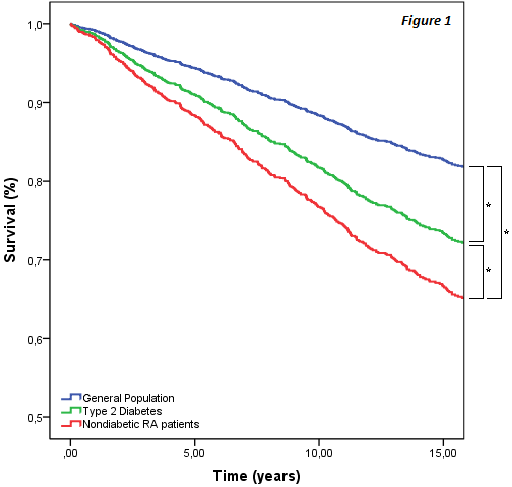Session Information
Date: Monday, November 14, 2016
Title: Rheumatoid Arthritis – Clinical Aspects II: Risk and Impact of Comorbidity
Session Type: ACR Concurrent Abstract Session
Session Time: 2:30PM-4:00PM
Background/Purpose: Cardiovascular (CV) disease is a prevalent comorbidity in patients with rheumatoid arthritis (RA). However, recent cohort studies with long term follow up studying this risk are scarce. We report the results of a 15 year observational cohort study comparing the risk of CV events in patients with RA to the general population and participants with type 2 diabetes (DM).
Methods: The CARRÉ study is a prospective cohort study with the purpose of investigating CV disease and its risk factors in a random sample of 353 patients with longstanding RA. CV endpoints were assessed at baseline, 3, 10 and 15 years of follow up and compared to the Hoorn Study population (n=2540), a cohort representative of the general population designed to analyze glucose metabolism and CV risk factors over 15 years. Incidence rates per 100 person-years were calculated and Cox regression analyses were performed to investigate CV risk in these persons.
Results: 96 patients with RA developed a CV event during 2703 person-years of follow up resulting in an incidence rate of 3.6 per 100 person-years. In the Hoorn Study population, 298 individuals developed a CV event, of which 41 had DM, during a follow up of 25335 person-years, resulting in an incidence rate of 1.4 per 100 person-years in the general population. Age and sex adjusted hazard rates (HR) for CV events were increased for RA (2.14 [95% CI 1.65-2.78, P<0.01]) and DM (1.63 [95% CI 1.17 – 2.27, P<0.01]) compared to the general population (figure 1). HR was significantly increased in RA (1.73 [95% CI 1.27 – 2.35, P<0.01]) and reached borderline significance in DM (1.42 [95% CI 1.00 – 2.00, P=0.047]) after additional adjustment for traditional CV risk factors (figure 2). Exclusion of prevalent CV disease resulted in increased HR for RA (2.16 [95% CI 1.53 – 3.04, P<0.01]) and not for DM (1.28 [95% CI 0.83 – 1.98, P=0.27]) compared to the general population after adjustment for traditional CV risk factors.
Conclusion: The incidence rate of CV events was 3.6 per 100 person-years in patients with established RA which is more than double that of the general population. RA patients have an increased risk of CV endpoints comparable to type 2 DM. This increased risk remains for RA patients even after adjustment for traditional CV risk factors, indicating that the (ongoing) systemic inflammation of RA is an independent contributor to CV risk.
To cite this abstract in AMA style:
Agca R, Hopman LHGA, van Halm VP, Peters MJL, Dekker JM, Nijpels G, Stehouwer CDA, Smulders YM, Voskuyl AE, Boers M, Lems WF, Nurmohamed MT. Increased Risk of Cardiovascular Events in Patients with Rheumatoid Arthritis over a 15 Year Time Period That Is Comparable to Type 2 Diabetes [abstract]. Arthritis Rheumatol. 2016; 68 (suppl 10). https://acrabstracts.org/abstract/increased-risk-of-cardiovascular-events-in-patients-with-rheumatoid-arthritis-over-a-15-year-time-period-that-is-comparable-to-type-2-diabetes/. Accessed .« Back to 2016 ACR/ARHP Annual Meeting
ACR Meeting Abstracts - https://acrabstracts.org/abstract/increased-risk-of-cardiovascular-events-in-patients-with-rheumatoid-arthritis-over-a-15-year-time-period-that-is-comparable-to-type-2-diabetes/


